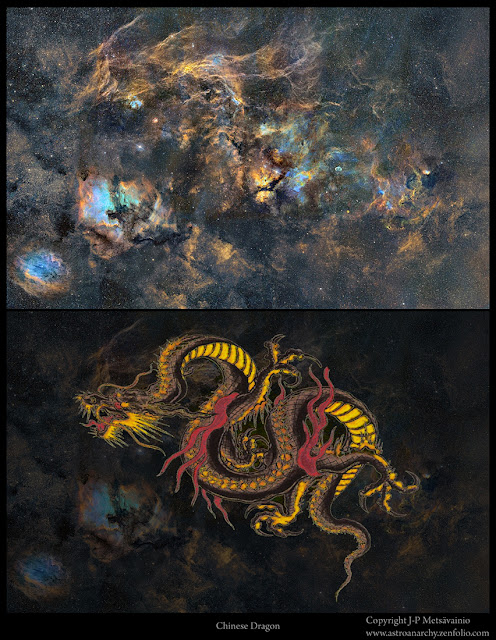COPYRIGHT, PLEASE NOTE
All the material on this website is copyrighted to J-P Metsavainio, if not otherwise stated. Any content on this website may not be reproduced without the author’s permission.
BUY A MUSEUM QUALITY POSTER
BUY A POSTER:https://astroanarchy.zenfolio.com/
Tuesday, November 6, 2012
A Chinese Dragon
Chinese Dragon Nebula in constellation Cygnus

Click for a large image

Click for a large image
The very large, 18-panels, mosaic of the Cygnus was my main work at Autumn season 2011.
I named it to the Chinese Dragon Nebula due to reason seen in the image above.
Image spans 22 degrees horizontally. (22 degrees = 44 full Moons side by side in the sky)
http://astroanarchy.blogspot.fi/2011/12/cygnus-mosaic-18-panels-and-22-x-14.htmlHeart and Soul Nebulae, reprocessed
Since the weather up here has been less than supportive for astronomical imaging for a long time, I have played with an older data.
Heart & Soul Nebulae
IC1805 & IC1848
Image is in HST-palette, (HST=Hubble Space Telescope) from the emission of ionized elements,
R=Sulfur, G=Hydrogen and B=Oxygen.
Star colors are mixed from the NB channels, Red=H-a, G=O-III and B= 85%O-III + 15%H-a.
My photos, from several years, are used to combine this panoramic image of IC 1805 & 1848.
This emission nebula area is located in constellation Cassiopeia at distance of about 7500 light years.
I have made a scale study to show the apparent scale in the sky, it can be seen here:
Image is in visual spectrum, mixed from the same narrowband material, than image above.
Images used for the panorama with technical details
Monday, November 5, 2012
ART
I have seen this phrase somewhere, can't remember when and where though.
Image at the background is imaged at 2011.
It's part of the very large, 18-panel, mosaic image of Cygnus constellation.
Details here: http://astroanarchy.blogspot.fi/2011/12/cygnus-mosaic-18-panels-and-22-x-14.html
I did this, since beside being an astronomical photographer, this is an art form for me.
All my images can be seen in my portfolio: http://astroanarchy.zenfolio.com/
Saturday, November 3, 2012
An experimental 3D-animation of the Pelican Nebula
Since the Weather doesn't support new images, I'm publishing some experimental work here.
I have tested a new method to publish my 3D-images as a form of Lenticular prints.
For this technique to work, I need series of images from different angles, in this case 24 images are needed.
Lenticular printing is actually an old technique but in past few years it has become much more sophisticated.
The results can be stunning visually, image plane disappears and object floats in and outside of the frame.
Since astronomical objects are too far away, no real parallax can be imaged. Doe to that, I have developed a method to turn my images to various 3D-formats. My work flow is based on scientific data from the object, distance and the source of ionization are usually known. The different types of the nebulae has typical structures, pillar like formations must point to the source of ionization, the radiation pressure forms kind of hollow area, inside of the nebula, around newly born stars, dark nebulae must be at front of the emission ones to show, etc... rest of the missing information is then replaced with an artistic vision.
The whole process is pretty much like sculpting!
I have tested a new method to publish my 3D-images as a form of Lenticular prints.
For this technique to work, I need series of images from different angles, in this case 24 images are needed.
Lenticular printing is actually an old technique but in past few years it has become much more sophisticated.
The results can be stunning visually, image plane disappears and object floats in and outside of the frame.
Since astronomical objects are too far away, no real parallax can be imaged. Doe to that, I have developed a method to turn my images to various 3D-formats. My work flow is based on scientific data from the object, distance and the source of ionization are usually known. The different types of the nebulae has typical structures, pillar like formations must point to the source of ionization, the radiation pressure forms kind of hollow area, inside of the nebula, around newly born stars, dark nebulae must be at front of the emission ones to show, etc... rest of the missing information is then replaced with an artistic vision.
The whole process is pretty much like sculpting!
The Pelican Nebula in Cygnus as an animation
Only real elements from the original 2D-image are used for the animation
NOTE! Let the animation load, ~7MB
This is a personal vision about forms and shapes, based on some known facts and an artistic impression.
An original 2D-image, used for the animation
Image above is a small part of the very large mosaic image of the Cygnus constellation
Original blog post about this mosaic, with technical details and large images:
PS.
Here are other 3D-formats out of the same material
Stereopairs
For Parallel vision method
For Cross vision method
An anaglyph Red/Cyan 3D
You'll need Red/Cyan eyeglasses to see this image as 3D.
Red lens goes to Left eye.
Labels:
animations
Subscribe to:
Comments (Atom)



















